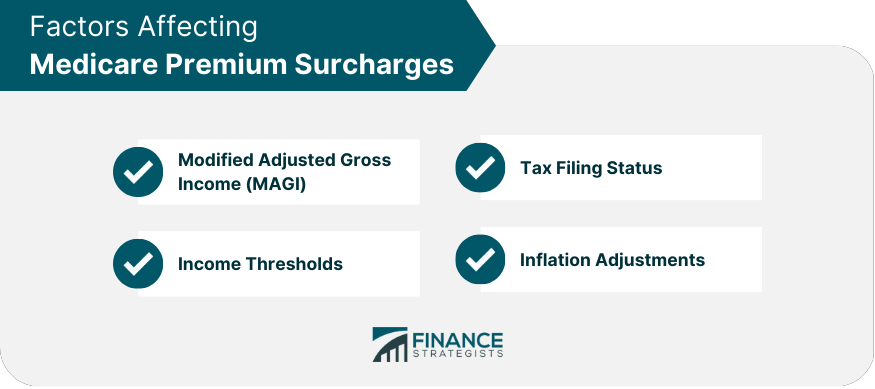Medicare premium surcharges are additional fees added to the standard Medicare Part B and Part D premiums for higher-income beneficiaries. These surcharges help cover the costs of the Medicare program and maintain its financial sustainability. The surcharges ensure that those with higher incomes contribute more to the Medicare program, in line with their ability to pay. Medicare premium surcharges apply to Medicare Part B, which covers medical services, and Medicare Part D, which covers prescription drug plans. Medicare premium surcharges are determined based on your MAGI, which includes your Adjusted Gross Income (AGI) and tax-exempt interest income. The surcharges apply to individuals and couples whose MAGI exceeds specific income thresholds, which are adjusted annually for inflation. Your tax filing status, such as single, married filing jointly, or married filing separately, will affect the income thresholds used to determine your surcharges. Income thresholds for surcharges are adjusted annually based on inflation, which may cause the thresholds to increase over time. IRMAA is an additional amount added to your Medicare Part B and Part D premiums based on your income. It is designed to ensure that higher-income individuals contribute more to the Medicare program. IRMAA is calculated using a tiered system based on your MAGI and tax filing status. As your MAGI increases, you move into higher tiers with larger surcharges. There are multiple IRMAA tiers, each with different income thresholds and surcharge amounts. The specific tiers and surcharges are updated annually by the Centers for Medicare & Medicaid Services (CMS). There are several strategies you can use to lower your MAGI and potentially avoid or reduce Medicare premium surcharges: By carefully planning withdrawals from retirement accounts such as traditional IRAs and 401(k)s, individuals can reduce their MAGI and avoid higher Medicare premiums. For example, they can withdraw funds from their Roth IRA, which is not subject to required minimum distributions (RMDs), instead of their traditional IRA, which is. Charitable donations can be a tax-efficient way to reduce MAGI. By donating to qualified charities, individuals can claim a tax deduction and reduce their taxable income, which in turn lowers their MAGI. Converting traditional IRA funds to a Roth IRA can be a way to reduce MAGI in the long term. While the conversion will increase taxable income in the year of the conversion, Roth IRA withdrawals are tax-free, which can reduce MAGI in future years. If you believe your Medicare premium surcharge is incorrect, you can request reconsideration or file an appeal with the Social Security Administration: Certain life events such as retirement, divorce, or the death of a spouse can lead to a reduction in income and may qualify individuals for a lower premium. In these cases, individuals can request a reconsideration of their premium based on the new circumstances. If a person disagrees with their premium surcharge, they can file an appeal with the Social Security Administration (SSA). The SSA will review the appeal and determine whether to adjust the premium based on the individual's circumstances. When planning for retirement, individuals should consider the potential impact of Medicare premium surcharges on their retirement income. This includes reviewing their projected income and understanding how it may affect their Medicare premiums. By incorporating these potential surcharges into their retirement plan, individuals can make more informed decisions about saving, spending, and investing. Medicare premiums are automatically deducted from Social Security benefits for most people, which means that surcharges can reduce the amount of net Social Security income. This is important to consider when planning for retirement income and managing cash flow. Individuals should work with financial professionals to understand how Medicare premiums may affect their Social Security benefits and develop strategies to minimize this impact. It is important for individuals to work with financial professionals who have experience in retirement planning and Medicare to develop a comprehensive plan that takes into account potential Medicare premium surcharges. Financial professionals can help individuals understand their options for avoiding or reducing surcharges, as well as how to incorporate them into their overall retirement income plan. They can also help individuals navigate the complex rules and regulations associated with Medicare and Social Security. Utilize government resources to assist with understanding and managing Medicare premium surcharges: Medicare.gov: The official government site for Medicare provides comprehensive information and resources on premium surcharges and IRMAA. Social Security Administration: This agency handles Medicare premium surcharge calculations and appeals, and can provide assistance with eligibility and premium questions. Seek guidance from professional advisors to help navigate Medicare premium surcharges: Financial Planners: These professionals can help you incorporate Medicare premium surcharges into your overall retirement strategy and provide advice on minimizing their impact. Tax Professionals: Tax experts can assist you in understanding the tax implications of your Medicare premiums and offer guidance on strategies to lower your MAGI. Understanding Medicare premium surcharges is essential for higher-income individuals to effectively plan for their healthcare expenses during retirement. By familiarizing yourself with the factors that affect surcharges and exploring strategies to minimize their impact, you can optimize your Medicare coverage and ensure you have access to affordable, high-quality healthcare services throughout your retirement years. Utilize available resources from the government, non-profit organizations, and professional advisors to support your planning efforts and stay informed about updates and changes to the Medicare premium surcharge system.What Are Medicare Premium Surcharges?
Factors Affecting Medicare Premium Surcharges
Modified Adjusted Gross Income (MAGI)
Income Thresholds
Tax Filing Status
Inflation Adjustments

Understanding IRMAA
What Is the Income-Related Monthly Adjustment Amount (IRMAA)?
How IRMAA Is Calculated
IRMAA Tiers
Avoiding or Reducing Medicare Premium Surcharges
Strategies for Lowering MAGI
Tax-Efficient Withdrawals From Retirement Accounts
Charitable Contributions
Roth IRA Conversions
Requesting Reconsideration or Appeal
Life-Changing Events
Filing an Appeal With the Social Security Administration
Planning for Medicare Premium Surcharges
Incorporating Surcharges Into Retirement Planning
Understanding the Impact on Social Security Benefits
Working With Financial Professionals

Resources for Navigating Medicare Premium Surcharges
Government Resources
Professional Advisors
Conclusion
Medicare Premium Surcharges FAQs
Medicare premium surcharges are additional fees that some Medicare beneficiaries may have to pay if they do not enroll in Medicare when they are first eligible or if they have a high income.
Beneficiaries who do not enroll in Medicare when they are first eligible or who have a high income may be subject to Medicare premium surcharges. The surcharges can apply to both Medicare Part B (medical insurance) and Medicare Part D (prescription drug coverage).
The amount of the Medicare premium surcharges varies depending on the specific circumstances of the beneficiary. For example, the late enrollment penalty for Part B is 10% of the monthly premium for each 12-month period that the beneficiary was eligible for Part B but did not enroll. The income-related monthly adjustment amount (IRMAA) for Part B and Part D is based on the beneficiary's modified adjusted gross income (MAGI) and can range from an additional $12.30 to $491.60 per month.
To avoid Medicare premium surcharges, beneficiaries should enroll in Medicare when they are first eligible, typically at age 65. Beneficiaries can also avoid IRMAA surcharges by keeping their income below the threshold amounts established by Medicare or by appealing the surcharge if they experience a qualifying life event that has reduced their income.
If a beneficiary cannot afford the Medicare premium surcharges, they may be eligible for financial assistance programs, such as the Medicare Savings Program or Extra Help. These programs can help cover the cost of premiums, deductibles, and other out-of-pocket expenses for eligible beneficiaries.
True Tamplin is a published author, public speaker, CEO of UpDigital, and founder of Finance Strategists.
True is a Certified Educator in Personal Finance (CEPF®), author of The Handy Financial Ratios Guide, a member of the Society for Advancing Business Editing and Writing, contributes to his financial education site, Finance Strategists, and has spoken to various financial communities such as the CFA Institute, as well as university students like his Alma mater, Biola University, where he received a bachelor of science in business and data analytics.
To learn more about True, visit his personal website or view his author profiles on Amazon, Nasdaq and Forbes.















